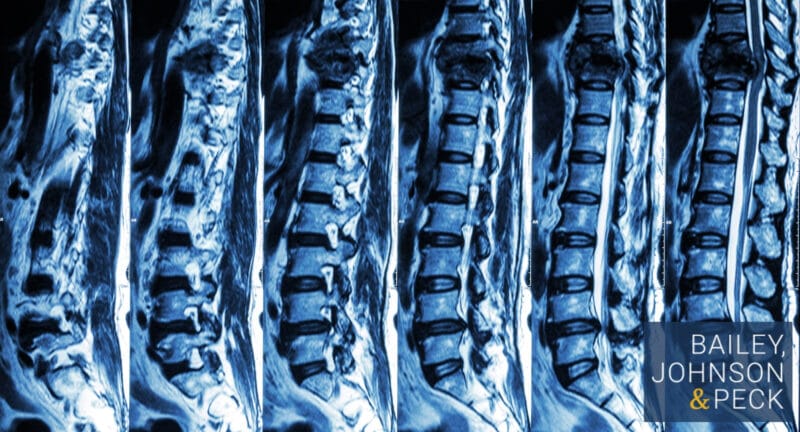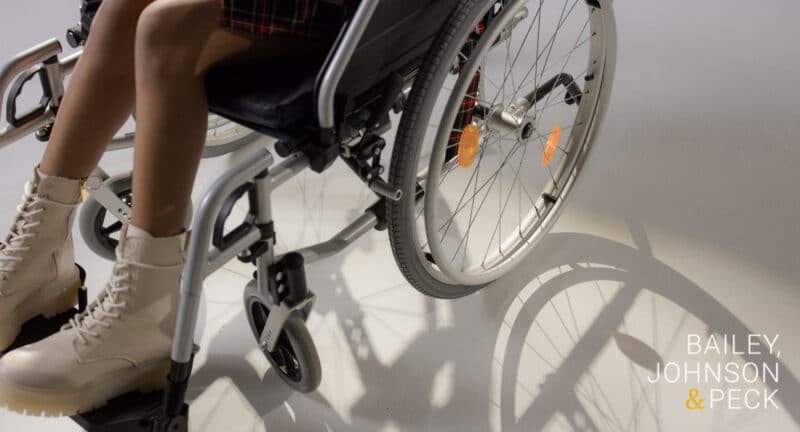
SOUND COUNSEL. STRAIGHT TALK. SENSIBLE SOLUTIONS.
New York Spinal Cord Injury Attorney
Spinal cord injuries are physically, emotionally, and financially devastating not only for the victims but for their families as well. When the breadwinner of the family suffers catastrophic injuries as a result of someone else’s negligence, they are likely going to suffer a lifetime of medical bills and pain and suffering. On top of that, many SCI or catastrophic injury victims never fully recover, leaving them jobless for years to come. If the breadwinner of the family is the injured person in question, that means the other spouse or children must figure out a plan to pay off the medical debt while also making sure food gets on the table every day. The emotional distress that comes with caring for the catastrophically injured person is another matter. If this sounds similar to your current situation, you may have grounds to hire a spinal cord injury attorney and file a personal injury lawsuit.
The legal team at Bailey, Johnson & Peck has decades of combined experience in handling spinal cord injury cases involving negligence. We fully understand the physical, emotional, and financial toll that these injuries have on victims and their families. That’s why we are so passionate about fighting for maximum recovery. Call a New York spinal cord injury attorney today at 518-456-0082 to schedule a free consultation.

What is a Spinal Cord Injury (SCI)?
A spinal cord injury is basically damage to the spinal cord or the cauda equina (the bundle of nerves at the bottom of the spinal canal) that can lead to a variety of life-altering health consequences. Even the most minor spinal cord injuries can drastically change a person’s strength and mobility for the rest of their lives.
How Many Americans Suffer From Spinal Cord Injuries Every Year?
According to 2019 data from the National Spinal Cord Injury Statistical Center (NSCISC), approximately 17,700 Americans suffer from a spinal cord injury every year. This means that there are approximately 54 spinal cord injury cases per 1 million people in the U.S. Additionally, the NSCISC estimates that anywhere from 249,000 to 363,000 Americans are living with a spinal injury.
Types of Spinal Cord Injuries
There are two main types of spinal cord injuries: complete injuries and incomplete injuries.
Victims with a complete injury generally lose all sensation and mobility below the spinal cord injury. For example, let’s say you suffer spinal cord damage in your neck (cervical spine) and have no sensation or mobility below the neck. This is what doctors call a complete injury.
Meanwhile, an incomplete injury is one that allows a victim to have some sensation and mobility below their spinal injury. Incomplete injuries certainly come in varying degrees. For example, one person with an incomplete injury may be able to move a finger or toe below their injury while another person may be able to move an entire arm or leg below their injury.
Does a Spinal Cord Injury Cause Paralysis?
Yes, spinal cord injuries often cause paralysis. The extent of the damage along with where the injury occurred in the spinal cord often determines the type of paralysis.
Types of Paralysis
There are four main types of paralysis, including:
- Monoplegia only prevents a person from moving one arm or leg.
- Hemiplegia generally prevents a person from moving an arm and a leg on the same side of their body.
- Paraplegia prevents a person from moving both legs.
- Quadriplegia prevents a person from moving both arms and legs.
Spinal injuries are only one common cause of paralysis. Unfortunately, people can suffer from any of the aforementioned types of paralysis from birth injuries such as cerebral palsy, traumatic brain injuries, post-polio syndrome, stroke, and more.
Spinal Cord Injury Symptoms
SCI symptoms generally begin immediately following an accident. Victims may experience:
- Loss of movement or sensation in one or more limbs
- Loss of bladder control or bowel control
- Muscle spasms and exaggerated reflexes
- Loss of sexual function
- Muscle weakness
- Numbness and tingling in multiple areas of the body
- Difficulty walking and balancing
- Difficulty breathing
- Intense pain and pressure in the head, neck, or back
- Lack of coordination in movements
- An obviously twisted head, neck, or back

Common Causes of a Spinal Cord Injury
Basically, any traumatic blow to the head, neck, or back can cause an SCI. The most common causes of an SCI are listed below.
- Sports injuries
- Motor vehicle accidents such as car accidents, truck accidents, motorcycle accidents, etc.
- Medical malpractice incidents such as surgical errors and epidural errors
- Spinal cord infections
- Diving head-first into the shallow end of a pool
- Birth injuries
- Slip and fall accidents
- Accidents on a trampoline, which are very common among children
- Acts of violence such as gunshots and stabbings
- Construction accidents
According to data from the NSCISC, car accidents are responsible for nearly 40% of spinal cord injuries since 2015. Slips and falls come in second place, causing nearly 32% of spinal cord injuries since 2015.
Can You Have a Traumatic Brain Injury (TBI) and a Spinal Cord Injury (SCI) at the Same Time?
Yes, it is very possible to sustain a traumatic brain injury and a spinal injury at the same time. A 2013 study even estimates that 16% to 74% of SCI patients also have a TBI.
This combination of catastrophic injuries is very common among car accident victims, diving victims, and even slip and fall victims. In all of these types of accidents, it’s very easy to suffer a traumatic blow to both the head and the spine at the same time.
Lifetime Costs for Spinal Cord Injury Victims
This may come as no surprise to anyone, but a catastrophic injury like an SCI is incredibly expensive. Also, these expenses generally aren’t a one-time occurrence, meaning that they don’t just occur immediately following the injury. Many SCI victims must endure a lifetime of medical bills and other expenses not only to stay alive but to have the best quality of life possible.
The NSCISC estimates that the average lifetime expenses for a tetraplegia patient range from $2,251944 to $5,010,748. Meanwhile, the average lifetime costs associated with paraplegia range from $1,608,015 to $2,450,234. These expenses are only associated with medical care and do not include indirect expenses such as lost wages. However, the NSCISC estimates that the average amount of indirect expenses associated with an SCI is $76,000 annually (in 2018 dollars).
It’s important to note that present and future costs associated with an SCI greatly depend on the severity of the spinal injury, the level of neurological impairment, employment history before the injury occurred, age, and so much more. But it’s safe to say that severe injuries like an SCI are physically, emotionally, and financially devastating for the victims and their families. These injuries are even more devastating when someone else’s negligence was the direct cause.
That’s why it’s so important to call a spinal cord injury lawyer at Bailey, Johnson & Peck. We are passionate about seeking compensation for every victim whose injury was the direct result of negligence. We fully understand how life-altering these serious injuries are, so you can trust that we will fight for the best case outcome possible for you and your family.
Spinal Cord Injury Damages
Spinal cord injury lawyers at Bailey, Johnson & Peck can help you recover fair compensation for:
- Past and future medical expenses
- Past and future rehabilitative expenses
- Expenses for necessary medical equipment such as wheelchairs, breathing machines, etc.
- Caretaking expenses
- Physical pain and suffering
- Emotional distress
- Therapy costs associated with emotional distress
- Loss of consortium
- Lost wages
- Loss of earning capacity
- Loss of enjoyment of daily life
How to Prove Negligence in a Spinal Cord Injury Case
Proving negligence in an SCI case is very similar to proving negligence in any other personal injury case. Personal injury attorneys at Bailey, Johnson & Peck will help you gather sufficient evidence to prove the four elements of negligence listed below.
- Duty of Care: Every person owes each other a specific duty of care. For example, all drivers are supposed to keep each other safe by avoiding drunk driving, texting and driving, etc.
- Breached Duty of Care: The negligent person or entity in question breached that duty of care.
- Causation: The negligent person or entity directly caused the victim’s SCI. Personal injury lawyers can prove this through crucial pieces of evidence such as police reports, surveillance footage, medical records, witness statements, accident reconstruction, etc.
- Damages: The SCI victim and their family suffered a variety of damages for which they should receive maximum compensation.
New York Statute of Limitations for a Spinal Cord Injury
In New York, the statute of limitations for an SCI claim is the same as a personal injury claim. Injured people must file a spinal cord injury lawsuit within 3 years of their injury in order to recover damages. The clock starts ticking on the day that the SCI occurred. That’s why it’s crucial to hire an Albany personal injury lawyer as soon as possible so that you and your family can receive justice for your pain and suffering.

Call a New York Spinal Cord Injury Attorney at Bailey, Johnson & Peck Today
Bailey, Johnson & Peck is a top-notch personal injury law firm in Albany, NY. We are passionate about pursuing legal action for all victims of negligence, including SCI victims. Our compassionate legal team will first determine if you have legal grounds to sue the negligent party, and then fight for fair spinal cord injury compensation on your behalf. We are ready to begin an attorney-client relationship with you. Call a spinal cord injury attorney at 518-456-0082 to schedule a free consultation.Practice Areas
Helping Injury Victims
Put Their Lives Back Together
Schedule a Consultation
Our attorneys have extensive experience in personal injury law, including car accidents, slip-and-fall accidents, catastrophic injuries and wrongful death. If you have questions about insurance coverage and how to get the financial compensation you need, contact us today to see how we can help.
We have represented many clients on both sides of personal injury and insurance disputes. Let us use our depth of knowledge and experience to help you and your family get the medical care and financial compensation you need and deserve.


